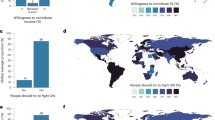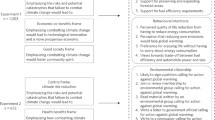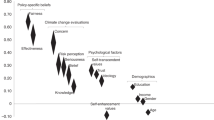Abstract
To what extent citizens are willing not only to support ambitious climate policy but also willing to pay for such policy remains subject to debate. Our analysis addresses three issues in this regard: whether, as is widely assumed but not empirically established, willingness to support (WTS) is higher than willingness to pay (WTP); whether the determinants of the two are similar; and what accounts for within-subject similarity between WTS and WTP. We address these issues based on data from an original nationally representative survey (N = 2500) on forest conservation in Brazil, arguably the key climate policy issue in the country. The findings reveal that WTP is much lower than WTS. The determinants differ to some extent as well, regarding the effects of age, gender, and trust in government. The analysis also provides insights into factors influencing how much WTS and WTP line up within individuals, with respect to age, education, political ideology, salience of the deforestation issue, and trust in government. Our findings provide a more nuanced picture of how strong public support for climate change policy is and a starting point for more targeted climate policy communication.
Similar content being viewed by others
References
Aldy JE, Kotchen MJ, Leiserowitz A (2012) Willingness to pay and political support for a US national clean energy standard. Nat Clim Chang 2(8):596–599
Bechtel M, Scheve K (2013) Mass support for global climate agreements depends on institutional design. Proc Natl Acad Sci 110(34):13763–13768
Bernauer T, McGrath L (2016) Simple reframing unlikely to boost public support for climate policy. Nat Clim Chang 6(7):680–683
Binstock RH, Quadagno J (2001) Aging and politics. In: Binstock RH, George LK (eds) Handbook of aging and the social sciences. Academic Press, San Diego, pp 333–351
Brechin SR (2003) Comparative public opinion and knowledge on global climatic change and the Kyoto Protocol: the US versus the world? Int J Sociol Soc Policy 23(10):106–134
Breffle WS, Eiswerth ME, Muralidharan D, Thornton J (2015) Understanding how income influences willingness to pay for joint programs: a more equitable value measure for the less wealthy. Ecol Econ 109:17–25
Brouwer RL, Brander, Van Beukering P (2008) “A convenient truth”: air travel passengers’ willingness to pay to offset their CO2 emissions. Clim Chang 90(3):299–231
Bruderer E, Diekmann HA, Meyer R (2014) Subjective discount rates in the general population and their predictive power for energy saving behavior. Energ Policy 65:524–540
Bürer MJ, Wüstenhagen R (2009) Which renewable energy policy is a venture capitalist’s best friend? Empirical evidence from a survey of international cleantech investors. Energ Policy 37(12):4997–5006
Cameron TA (2005) Individual option prices for climate change mitigation. J Public Econ 89(2):283–301
Carlsson F, Martinsson P (2001) Do hypothetical and actual marginal willingness to pay differ in choice experiments? Application to the valuation of the environment. J Environ Econ Manag 41:179–192
Diamond PA, Hausman JA (1994) Contingent valuation: is some number better than no number? J Econ Perspect 8(4):45–64
Diederich J, Goeschl T (2014) Willingness to pay for voluntary climate action and its determinants: field-experimental evidence. Environ Resour Econ 57(3):405–429
Diekmann A, Preisendörfer P (2003) Green and greenback the behavioral rffects of environmental attitudes in low-cost and high-cost situations. Ration Soc 15(4):441–472
Dolan P, Hallsworth M, Halpern D, King D, Metcalfe R, Vlaev I (2012) Influencing behaviour: the mindspace way. J Econ Psychol 33(1):264–277
Drews S, Van den Bergh JC (2016) What explains public support for climate policies? A review of empirical and experimental studies. Clim Pol 16(7):855–876
Fairbrother M (2016) Trust and public support for environmental protection in diverse national contexts. Sociol Sci 3:359–382
Gampfer R, Bernauer T, Kachi A (2014) Obtaining public support for north-south climate funding: evidence from conjoint experiments in donor countries. Glob Environ Chang 29:118–126
Gebara MF, Fatorelli L, May P, Zhang S (2014) REDD+ policy networks in Brazil: constraints and opportunities for successful policy making. Ecol Soc 19(3):329–333
Geels FW (2013) The impact of the financial–economic crisis on sustainability transitions: financial investment governance and public discourse. Environ Innov Soc Trans 6:67–95
Goerres A (2008) The grey vote: determinants of older voters’ party choice in Britain and West Germany. Elect Stud 27(2):285–304
Grothmann T, Patt A (2005) Adaptive capacity and human cognition: the process of individual adaptation to climate change. Glob Environ Chang 15(3):199–213
Hanemann WM (1994) Valuing the environment through contingent valuation. J Econ Perspect 8(4):19–43
Harring N, Jagers S (2013) Should we trust in values? Explaining public support for pro-environmental taxes. Sustainability 5(1):210–227
Inglehart R (1995) Public support for environmental protection: objective problems and subjective values in 43 societies. PS: Pol Sci Polit 28(01):57–72
Jaccard M, Nyboer J, Bataille C, Sadownik B (2003) Modeling the cost of climate policy: distinguishing between alternative cost definitions and long-run cost dynamics. Energy J 24:49–73
Jacobsen JB, Hanley N (2009) Are there income effects on global willingness to pay for biodiversity conservation? Environ Resour Econ 43(2):137–160
Kachi A, Bernauer T, Gampfer R (2015) Climate policy in hard times: are the pessimists, right? Ecol Econ 114:227–241
Kane S, Shogren J (2000) Linking adaptation and mitigation in climate change policy. Clim Chang 45(1):75–102
Kotchen J, Boyle K, Leiserowitz A (2013) Willingness-to-pay and policy-instrument choice for climate-change policy in the United States Energy. Policy 55:617–625
Krosnick JA, MacInnis B (2013) Does the American public support legislation to reduce greenhouse gas emissions? Daedalus 142(1):26–39
Lindhjem H, Tuan T (2012) Valuation of species and nature conservation in Asia and Oceania: a meta-analysis. Environ Econ Policy Stud 14(1):1–22
McCollum D, Krey V, Riahi K, Kolp P, Grubler A, Makowski M, Nakicenovic N (2013) Climate policies can help resolve energy security and air pollution challenges. Clim Chang 119(2):479–494
McCright A (2010) The effects of gender on climate change knowledge and concern in the American public. Popul Environ 32(1):66–87
Nisbet EC, Cooper KE, Garrett RK (2015) The partisan brain: how dissonant science messages lead conservatives and liberals to (dis) trust science. ANNALS Am Acad Polit Soc Sci 658(1):36–66
Nordhaus W (2015) Climate clubs: overcoming free-riding in international climate policy. Am Econ Rev 105(4):1339–1370
Pew Research Center (2015) Pew global attitudes project. Available at http://assets.pewresearch.org/wp-content/uploads/sites/2/2015/11/Pew-Research-Center-Climate-Change-Report-FINAL-November-5-2015.pdf. Accessed September 2017
Randall A, Stoll JR (1980) Consumer’s surplus in commodity space. Am Econ Rev 70(3):449–455
Ryan AM, Spash CL (2011) Is WTP an attitudinal measure? Empirical analysis of the psychological explanation for contingent values. J Econ Psychol 32(5):674–687
Scruggs L, Benegal S (2012) Declining public concern about climate change: can we blame the great recession? Glob Environ Chang 22(2):505–515
Seip K, Strand J (1992) Willingness to pay for environmental goods in Norway: a contingent valuation study with real payment. Environ Resour Econ 2(1):91–106
Solomon BD, Johnson NH (2009) Valuing climate protection through willingness to pay for biomass ethanol. Ecol Econ 68(7):2137–2144
Stern NH, Peters S, Bakhshi V, Bowen A, Cameron C, Catovsky S, Crane D, Cruickshank S, Dietz S, Edmonson N, Garbett SL (2006) Stern review: the economics of climate change (Vol 30). Cambridge University Press, Cambridge
Tobler C, Visschers VH, Siegrist M (2012) Addressing climate change: determinants of consumers’ willingness to act and to support policy measures. J Environ Psychol 32(3):197–207
Turpie JK (2003) The existence value of biodiversity in South Africa: how interest experience knowledge income and perceived level of threat influence local willingness to pay. Ecol Econ 46(2):199–216
Victor DG, House JC, Joy S (2005) A Madisonian approach to climate policy. Science 309(5742):1820–1821
Vincent JR, Carson RT, DeShazo JR, Schwabe KA, Ahmad I, Chong SK, Chang YT, Potts MD (2014) Tropical countries may be willing to pay more to protect their forests. Proc Natl Acad Sci 111(28):10113–10118
Wiseman J, Edwards T, Luckins K (2013) Post carbon pathways: towards a just and resilient post carbon future. Environ Innov Soc Trans 8:76–93
Acknowledgements
The research for this article was funded by the ERC Advanced Grant “Sources of Legitimacy in Global Environmental Governance” (Grant: 295456) and supported by ETH Zurich.
Author information
Authors and Affiliations
Corresponding author
Electronic supplementary material
ESM 1
(DOCX 1497 kb)
Rights and permissions
About this article
Cite this article
Bakaki, Z., Bernauer, T. Citizens show strong support for climate policy, but are they also willing to pay?. Climatic Change 145, 15–26 (2017). https://doi.org/10.1007/s10584-017-2078-x
Received:
Accepted:
Published:
Issue Date:
DOI: https://doi.org/10.1007/s10584-017-2078-x




